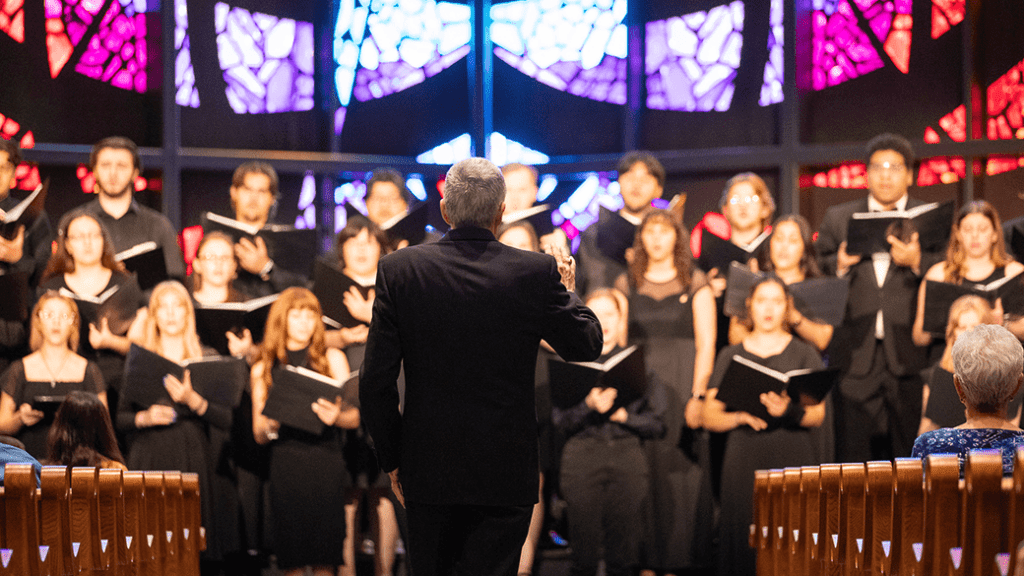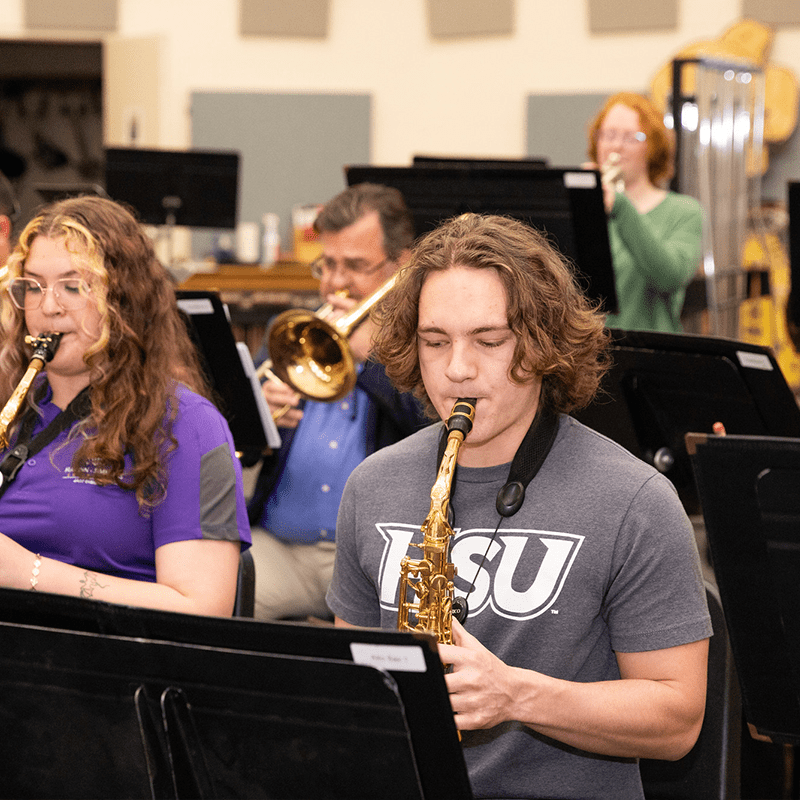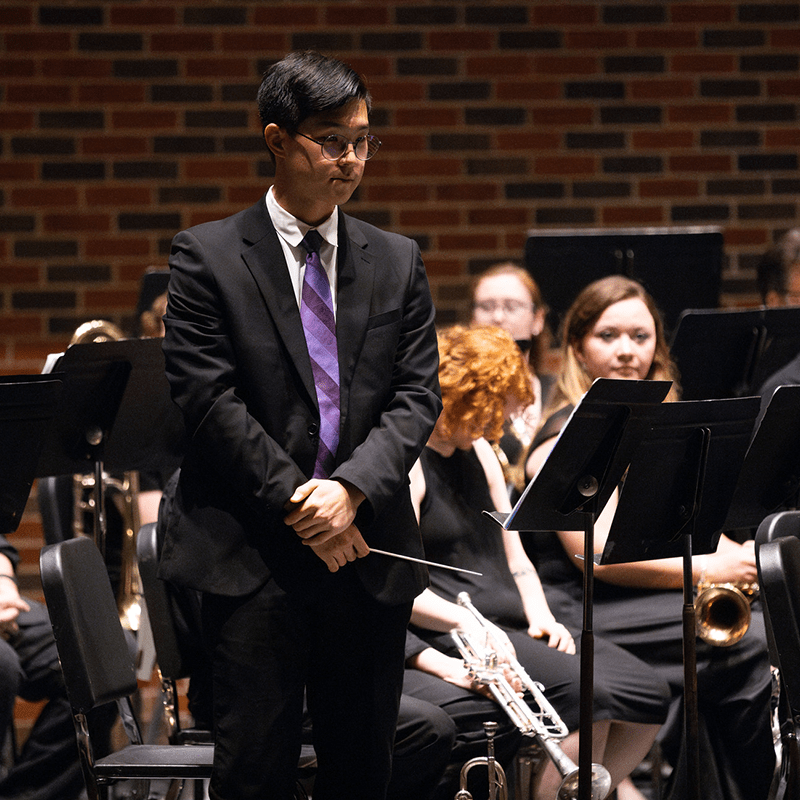Intro Block Section Instruction
Form Block Section
Write all of the introduction content below. Only use NON
FULL-WIDTH blocks.
Full-Width blocks can be inserted
outside of this block and will wrap around the form.
Use the custom HTML block below to embed your form.
Find harmony in your career.
There are multiple paths available for you to embrace the world of music. A music degree focuses on theory, history, performance, composition, and education, while music business is where your love for music meets the dynamic world of entrepreneurship and innovation. No matter your choice, these degree paths will empower you to explore various avenues, from concert promotion and music production to artist management, music education, and everything in between.
Pursue your passion for performing music and learn the fundamentals of music business with Hardin-Simmons University’s music degree programs. When you earn your Bachelor of Arts in Music or Music Business from HSU, you’ll be prepared for a wide variety of careers in music and music-related fields, such as producing, performing, advertising, management, and law.
Thanks to a combination of small classes, highly experienced faculty members, and internship opportunities, you’ll benefit from a well-rounded, intensive educational experience that will help you achieve your personal and professional dreams in the world of music.
A Degree in Music Tailored to You
You can choose between two music degrees: a Bachelor of Arts in Music degree and a Bachelor of Arts in Music Business degree—letting you focus your course of study to suit your goals.
You’ll complement your Bachelor of Arts in Music with a minor in another area of study, as well as a study in a foreign language of your choice, to foster breadth of knowledge and skills.
If the business side of music interests you, our music business degree adds onto the general music degree with courses in business, accounting, and media marketing to provide you with a balanced knowledge of music and music management. You’ll also have access to a music business internship to give you practical experience applying your studies and to help you build a robust resume.
Why Earn Your Degree in Music at Hardin-Simmons?
Why Earn Your Degree in Music at Hardin-Simmons?
Hands-On Experience in Music
Our small class sizes provide many opportunities for collaboration with other music degree students and faculty. You’ll also have chances to participate around campus in music-related events and programs, as well as internships that prepare you for a variety of careers in music.
A Degree in Music with Community
Our Bachelor of Arts in Music students develop lasting personal and professional relationships with each other and faculty members. They also make meaningful connections with others in the music business and around the community.
A Well-Rounded Degree in Music
Becoming a musician is about so much more than learning the fundamentals of music. One of the things that makes us stand out from to other music degrees is our inclusion of a minor outside music and foreign language study to give you a balanced liberal arts knowledge.
Outcomes
The field of music is remarkably diverse, with many unique career paths. Past graduates of our music business degree have found satisfying careers in music stores, production studios or at other music facilities. Many other graduates have pursued careers in business and law. General music majors have gone on to work as educators, solo musicians, or session band musicians.
With a mix of theory and hands-on practice, you’ll also be well-prepared for advanced graduate music degree programs to further hone your skills and knowledge.
In addition to the satisfaction of pursuing your passions, you’ll also benefit from the very good job security of careers in music. According to the Bureau of Labor Statistics (BLS), employment for musicians and singers is predicted to grow by 11% over the next decade, thanks in large part to the prevalence of streaming platforms. Employment for music directors and composers is predicted to grow about 6%, adding about 6,000 new jobs each year.
How much can you make with a music major?
According to the BLS, musicians and singers earn an average salary of $65,000, while music directors and composers earn on average $52,000 a year.
“As a production manager, I am constantly coordinating many musical and technical parts throughout the band’s performance. Thanks to all of my education in Conducting concert band, playing in the World-Famous Cowboy Band, and music education from HSU, I am able to wrangle the herd of day to day work that makes an arena tour happen.”
Ismael Loredo

Program Details
Click on plus button at the bottom of this Accordion BLOCK (not accordion tab) to create a new tab. Select Accordion TAB block to edit tab headline. Select nested blocks within accordion tab to edit content.
-
Minor in Music
Master the fundamentals of music history, ear-training, and harmony while earning your bachelor’s degree. Whether you want to pursue a career in music or just want to learn more about it, our 18-credit hour minor in music is a terrific complement to nearly any major degree program. Explore coursework for the music minor at HSU.
-
Scholarships and Awards
We take pride in offering accessible and affordable music degrees and are committed to helping you afford your Bachelor of Arts in Music or Music Business. We have been blessed to have donors and alumni who allow us to offer scholarships exclusively for music majors. You may also be eligible for university-wide financial aid. Learn more about scholarships at Hardin-Simmons University.



